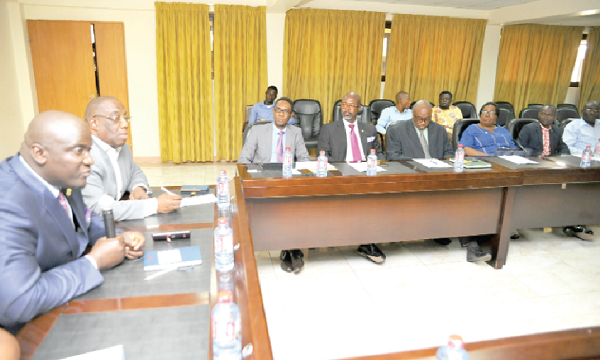
Professional body advises Transport Ministry on how to improve sector
The Chartered Institute of Logistics and Transportation (CILT) has presented an 11-point policy advice to the Ministry of Roads and Highways on how to bring sanity to the transport sector.
The document, among other proposals, recommends the need to make the major highways linking cities to the ports and borders dual carriages to reduce accidents through head-on collisions.
It also recommends that new road projects in the offing ought to have dedicated lanes for emergencies.
The institute proposed to the ministry to take steps to remove wrongfully placed billboards and sign posts from the highways and roads, contending that such materials obstructed vision and endangered the lives of drivers and passengers.
It underscored the need for strict standards to be adhered to in the erection of billboards.
The President of CILT, Mr Ebo Hammond, presented the document to the Deputy Minister of Roads and Highways, Mr Anthony Karbo, in Accra yesterday.
Present at the presentation were the Chief Executive of the Accra Metropolitan Assembly (AMA), Mr Mohammed Nii Adjei Sowah, and officials of the Ministry of Roads and Highways.
Monitoring
Mr Hammond called for constant monitoring of major roads to ensure that faded road markings were re-marked to improve night driving, especially in the absence of street lights on most highways.
“There is the need for most congested urban roads to be improved by opening up all access roads, slip roads, by-passes and one ways connecting major roads to help decongest the cities and reduce urban travel time,” he added.
He said it was also important for the government to always hire the services of professionals to execute complex road works.
Good initiatives
Mr Hammond said the initiative by the government to use cement for the construction of roads in the country was welcome news, since cement was cost-effective and would help create job opportunities.
He also noted that the initiative to create more regions called for the restructuring and remodelling of some road networks.
“The current quest for the creation of new regions will undoubtedly impact on the country's road network, as new regions would need to be linked to adjoining regions, warranting the remodelling of existing road networks of any new region that is created,” he said.
He urged the ministry to go back and study what he called the coherent and thoroughly researched Integrated Transport Plan (ITP) that was developed for Ghana in 2010.
Funding of roads
For his part, Mr Karbo described the meeting with CILT as timely, coming at a time when the government was exploring better means of funding major road projects.
“We have come to the point where the government’s budget cannot fund major road projects and so there is the need to seek private partnerships and concessionaires to help in the road sector. CILT should come on board and use its influence to support this drive,” he said.
He said the government was taking steps to implement bold initiatives, including bringing in concessionaires to support it to build a robust road infrastructure.
Mr Sowah, in a remark, indicated that the AMA had drawn up a plan to bring down billboards sited inappropriately by next year.
He said hawkers who had encroached pedestrian walkways would also be cleared to allow for the free movement of people and guarantee the safety of the public.
